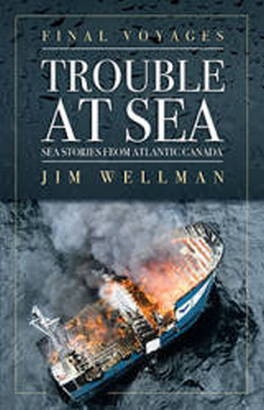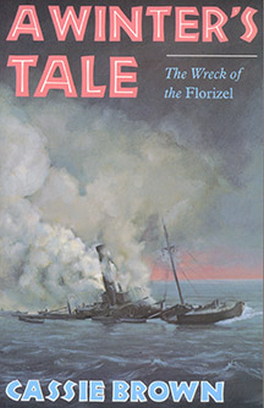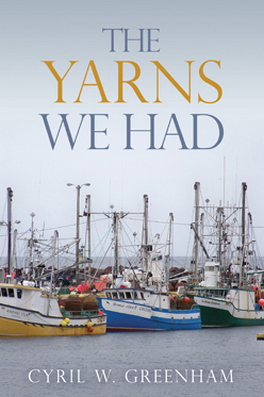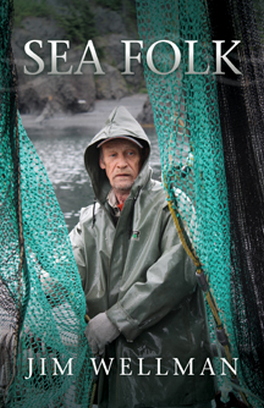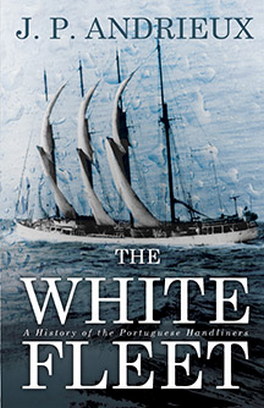Fishing is still the deadliest occupation in the country, and despite new and modern life-saving technology and better boats, the fatality rate in the industry is the same as it was twenty years ago. A whopping 70% of search and rescue calls are from fishing vessels in distress. For the past ten years, fisheries journalist Jim Wellman has documented the stories of some of the thousands of fishing people who have died in Atlantic Canada on small inshore fishing vessels. In Final Voyages Volume III, Wellman tells thirty-one riveting stories of the most courageous people that ever battled the merciless northwest Atlantic Ocean.
She Won’t Answer
Tuesday, September 15, 1891, was full of promise for the crew of the fishing vessel Blossom.
The crew of six men and one woman had one of the best fishing voyages in recent years in Labrador and were heading home to Purcell’s Harbour in Notre Dame Bay. Under the command of Captain Joseph Marsh, the 53-foot Blossom crossed the Strait of Belle Isle on Monday and hove to that night in White’s Arm on the so-called French Shore of the Northern Peninsula.
Tuesday morning dawned a damp, grey day, but a moderate northerly breeze created a fair wind to fill the sails of the sturdy little schooner.
Captain Marsh and his crew of Joseph Ings, James Witt, George Gidge, Obadiah Vining, Arthur Langdown, and Priscilla Langdown were beaming over the possibility of making it all the way home that night if the fair winds held.
They almost did.
Although loaded with salted codfish, the Blossom made excellent sailing time that day, and by suppertime, they were only five or six hours away from Purcell’s Harbour.
Usually the wind drops off as darkness falls, but on this day the exact opposite happened. Winds quickly freshened, and by 8:00 p.m. the skipper ordered the men to take down most of the canvas sails. The Blossom was then just off from the shores of northwestern Notre Dame Bay, so Captain Marsh called his crew together on deck to discuss what they should do next. With tell-tale signs of worsening weather, the experienced skipper was obviously worried and indicated that it might be best if they took shelter in the lee of the high cliffs nearby and wait till daylight to continue their trip Purcell’s Harbour. Anxious to get home as quickly as possible, the crew presented their case to the captain, suggesting that he should continue across Notre Dame Bay. William Marsh, a relative of the captain, later told a newspaper reporter that the crew had great confidence in their skipper and they also took comfort in their religious faith.
“We have children, we have wives, and the Lord has spared our lives and prospered our efforts of the summer, and we believe He will supply you with wisdom for any other need. We would spend tomorrow with our families and rest awhile before we unload,” they said.
Joseph Marsh was probably swayed by his own faith. A Sunday school teacher and lay reader in the Wesleyan Church, Joseph was also a deeply religious man.
“All right, then, we’ll go,” he replied.
Giving the command to take everything movable off the deck to prevent it from getting washed overboard, Captain Joseph Marsh stood grim-faced on deck, staring anxiously straight ahead through rain and fog, searching for signs of rocks or other potential trouble spots.
In an account of that moment, the Evening Telegram on September 18, 1891, described it with a flare of high drama:
“With every man at his post, dressed in hurricane gear, the ‘Blossom’ plunged into the stormy night and was more than anything like some submerged victim struggling with some demon of the deep.”
For the next several hours, the Blossom rode the waves like a trooper.
But their good luck was running out.
Just before midnight, the forward lookout yelled, “Land! Land straight ahead!”
“Hard down! Hard down! Hard!” yelled the skipper to the helmsman (a command to turn the wheel quickly).
“She won’t answer. She won’t answer!” the helmsman shouted back.
Seconds later, the Blossom struck the cliff off Gull Island, near Exploits Island. The force of the collision smashed off the vessel’s jib-boom and bowsprit as if they were pipestems.
As the crashing seas retreated from the cliffs, the disabled schooner slid back with it. The six men and Priscilla Langdown raced to the bow of the Blossom, knowing that the vessel would be thrown back against the cliffs again within seconds. Their hope was to jump to safety on shore when the schooner was near enough to the rocks.
As the Blossom was pushed against the rocks the second time, three men jumped, but only one made it to land. Joseph Ings, described as a “swift and agile” man, landed in shallow water and managed to crawl to the rocks. Once secure from the pounding surf, he turned around to check on his shipmates. Helpless, he could only watch as his two friends were swept away in the foaming seas.
Priscilla Langdown, the cook on the Blossom, was clinging to ropes on the bow of the vessel and knew she had only one chance of survival. With the boat breaking into pieces, she had to jump. She landed in the water just inches from where Joseph Ings was perched on a rock, but as he tried to grab her, the seas dragged her from his grasp and she too was swept away into the frothing ocean.
Joseph climbed to a rocky ledge to relative safety but could do nothing to help the three surviving men clinging to the wreckage of the vessel. Over the agonizing cries for help from the two men, Joseph Ings could hear his skipper, Joseph Marsh, singing a well-known Wesleyan hymn:
“With His loving hand to guide,
Let the clouds above me roll,
And the billows in their fury dash around me,
I can brave the wildest storm,
With His Glory in my soul,
I can sing amidst the tempest,
Praise the Lord.”
Sometime during the night, the voices were stilled and Joseph knew he was the only one left alive.
Fishermen from a nearby community saw pieces of wreckage on Wednesday morning and went to investigate. Spotting Joseph crouched on the ledge, they threw him a rope. With stormy seas still smashing against the cliffs, it was impossible for the trap skiff to land, so Joseph was faced with a daunting prospect. Chilled to the bone and weakened by hypothermia, after all night on the rocks, he slowly fastened the rope around his body and waited for just the right moment as the seas started to retreat from the cliffs. Mustering every ounce of strength left in his body, Joseph flung himself into the ocean. The fishermen dragged him through the water and finally managed to pull him on board their boat.
The swift and agile Joseph Ings survived that terrible accident, but Captain Joseph Marsh, along with James Witt, George Gidge, Obadiah Vining, Arthur Langdown, and Priscilla Langdown, had made their final voyage and died just three hours away from home on September 15, 1891.
The stories are compelling written, bringing the reader right into the action.-- The Chronicle Herald --
